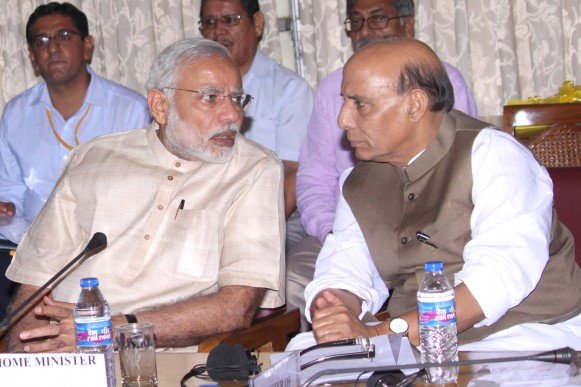Articles features
Modi's strongman image losing its lustre (Amulya Ganguli)

The expression of concern by President Pranab Mukherjee twice in less than a month over the deteriorating law and order situation is unusual for any head of state, especially if he holds a largely ceremonial position.
Because of his stature, the Bharatiya Janata Party (BJP) will not be able to brush aside his views as those of a "Nehruvian" or a "Leftist", as it has done with regard to the protests by the 40-odd writers who are also upset, like the president, about the signs of intolerance.
The BJP's other ploy of saying that the vandals are being arrested will not be convincing since, as the Shiv Sena's acts of criminal intimidation show, a few hours' detention followed by a release on bail are not a sufficient deterrent.
What is needed if the Narendra Modi government is serious about restoring order is a harsh step against the offenders such as the clamping of sedition charges on Hardik Patel in Gujarat.
Yet, similar threats by saffron storm-troopers, including BJP MP Sakshi Maharaj, who said that unless leaders change their mindset, they can be beaten up "in full public view", have gone unpunished.
All that the BJP has done is to ask such purveyors of hate in the Hindutva camp to be more restrained. It doesn't take much political insight to see that such demonstrations of "minimum governance" will do little to bring the law-breakers into line.
The latter are also probably encouraged by the description of the various tragic incidents as "small" by Rashtriya Swayamsevak Sangh (RSS) chief Mohan Bhagwat.
It is obvious that the BJP is caught in a bind. It is one thing to use a law redolent of colonial rule against a pesky political adversary, or let the Central Bureau of Investigation lose against an activist like Teesta Setalvad for having stood by the riot victims in 2002, and quite another to discipline the party's ideological brethren.
Even if the BJP succeeds in reining in the hate-mongers in its own ranks, it is virtually helpless where the rowdies of an ally like the Shiv Sena are concerned.
Although the BJP knows that the Sena's long-standing tactic of blackening faces will besmirch its own image, Maharashtra's political arithmetic makes it practically impossible to break the ties with the champions of Marathi manoos, whose leader, Uddhav Thackeray, has insolently pointed out that the Dadri lynching brought more shame to the country than the spraying of ink.
The government cannot be unaware that the disregard for law shown by the worshippers of cows, killers of rationalists, opponents of India-Pakistan cricketing ties and others with such limited, violence-prone agendas will spread the feeling of unease among the average law-abiding citizens and of terror among the minorities.
Moreover, the virtually daily litany of shocking incidents, including the rape of children and burning alive of Dalit infants by upper caste men, will tarnish India's reputation abroad and make prospective investors think twice before sinking their money into a country where the police appear unable to control the rampaging hoodlums.
There is little doubt that because of these "sad" and "unfortunate" incidents, as Modi said about the Shiv Sena's hooliganism in Mumbai, his strongman image is losing its lustre.
He had built it up and sustained it within the limited confines of Gujarat, but is evidently unable to do so in the much larger national arena.
His challengers are undoubtedly aware that the geographical spread of their lawlessness - lynchings in UP and Himachal Pradesh, killings of rationalists in Karnataka and Maharashtra, blackening of faces in Mumbai and Delhi - can make the task of imposing order difficult.
As a result, what must be worrying for the prime minister is that his efforts of modernization and economic growth cannot succeed in an atmosphere of tension and uncertainty.
It is not only the prime minister and a small pro-reforms group around him that find the present situation "extremely disturbing", as Finance Minister Arun Jaitley has said, but large segments of the 31 percent of voters who supported Modi last year are also disheartened by the government's failures on several fronts - economic and now administrative.
It has to be remembered that a good percentage of these voters are not traditional BJP supporters, but are largely apolitical who have been impressed by Modi's energy and commitment to development.
But if they see no positive development in the economic and administrative fields in the near future, they will slowly drift away to other parties.
Their first priority will be to see the government crack down on the wild elements so that the confidence of the ordinary people as well as the investors can be restored.
India lost the chance of taking the path of development under Manmohan Singh because of the roadblocks put up by the socialistic inclinations of Congress president Sonia Gandhi.
Now, the pro-Hindu rashtra objectives of the Sangh Parivar extremists and the narrow parochial ambitions of outfits like the Shiv Sena are hampering Modi's endeavours to move ahead with his pro-market policies.
Needless to say, both these groups have a blinkered outlook which is cut off from the modern world and have no idea of the vision of a 21st century nation which guides Modi.
(Amulya Ganguli is a political analyst. The views expressed are personal. He can be reached at amulyaganguli@gmail.com)



































